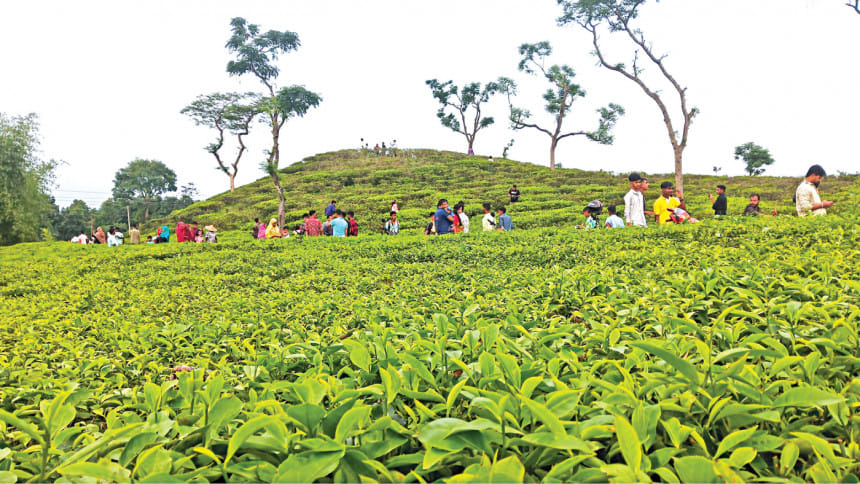Focus on Sylhet’s prospects to reduce regional disparity

The government should exploit the opportunities in northeastern districts by taking adequate measures when formulating the national budget for fiscal 2021-22 as it would help reduce regional disparity, according to various experts.
Besides, Sylhet should be considered a prospective economic hub as it has access to huge markets in the adjacent Indian provinces and a direct link to the rest of the world through its international airport.
"Sylhet was industrially underprivileged until very recently, when a few industrial and hi-tech parks were established by the government," said Abu Taher Md Shoeb, president of the Sylhet Chamber of Commerce and Industry (SCCI).
"So, the focus should be on infrastructural development, such as upgrading the Dhaka-Sylhet highway, establishing a bypass road for the airport, and many more projects which are vital for the region," he added.
The SCCI president also proposed that the government reserve a bulk allocation in the upcoming budget for small-and-medium businesses in order to help them survive the ongoing Covid-19 pandemic.
Sylhet is agriculturally vibrant and some of the more distinct products grown in the region, such as shatkora (a type of citrus fruit), betel leaf, various nuts and sugarcane, have high global demand.
"That is why the government should give emphasis on revitalising the different agricultural niches," said Md Abdul Hamid, a professor of the business administration department of the Shahjalal University of Science and Technology in Sylhet.
"Tourism in the region could also flourish if a little more was spent on related infrastructural development projects," he added.
Following a recent spike in the coronavirus infection rate, the government imposed strict measures on public movement, including the closure of all tourist spots, on April 14.
Since then, the industry has incurred daily losses between Tk 2 crore and Tk 3 crore.
"Businesses involved with the tourism industry are facing tough times so the government should have some good news for them in the budget," said Mutaher Hossain, chairman of the Association of Travel Agents of Bangladesh (Sylhet zone).
"For example, the acquittal of renewal fees or taxes, and a bulk allocation could save the businesses from being closed for good," he added.
Hossain also sought the government's attention for infrastructural development in all tourist spots and global branding.
Similarly, although Sylhet is famous for its tea. The industry has been struggling to survive due to climate change and low prices compared to product costs.
GM Shiblee, chairman of Bangladesh Tea Association's Sylhet branch, said climate change has led to an acute shortage of water for irrigation in all the valleys.
"Like any other agricultural sector, the government should consider our irrigation needs and keep an allocation in the budget for implementing an irrigation plan through agencies," Shiblee added.
Afzal Rashid Chowdhury, president of the Sylhet Metropolitan Chamber of Commerce and Industry (SMCCI), said the government should provide more stimulus funds for the tea industry at lower interest rates of 3.5 per cent to 4 per cent as the industry was passing through hard times.
"The government should also focus on the manufacturing of farm machineries so that this prospective industry could expand globally," he added.
Chandan Saha, president of Sylhet Coal Importers Group, said they struggle to get refunds when an inbound shipment of coal gets cancelled after the taxes were paid in advance.
"So, the pre-payment system should be cancelled and the added tax value should be reduced to 3 per cent from the existing 5 per cent," Saha added.
He also urged for the decentralisation of all export-import services so that local businesses do not need to go to Dhaka or Chattogram to avail them.
Faruque Mahmud Chowdhury, president of Shushashoner Jonno Nagorik's (Shujan) Sylhet chapter, said the budget was not just a matter of calculating income and expenses for the government but a reflection of the government's commitment to the people.
For example, the government allowing legalisation of black money does not reflect its commitment to a corruption-free country.
"For nationwide development, regional development is a must and so, the government should build more industrial zones in Sylhet, and offer more intensive facilities than Dhaka or Chattogram so that investors consider it a new hub," Chowdhury added.
Among other demands for the upcoming budget, various business leaders, civil societies and scholars have urged for the country's vast haor areas to be given emphasis in the budget.
They also suggested introducing a new ministry in this regard and decentralisation of the Haor and Wetland Development Board.
Other industries with potential in the region include ceramics, agro-products, consumer goods and fish processing.
They also urged for facilitating investment in the local health and education sector considering that the people of India's Seven Sister States are a potential market.

 For all latest news, follow The Daily Star's Google News channel.
For all latest news, follow The Daily Star's Google News channel. 



Comments